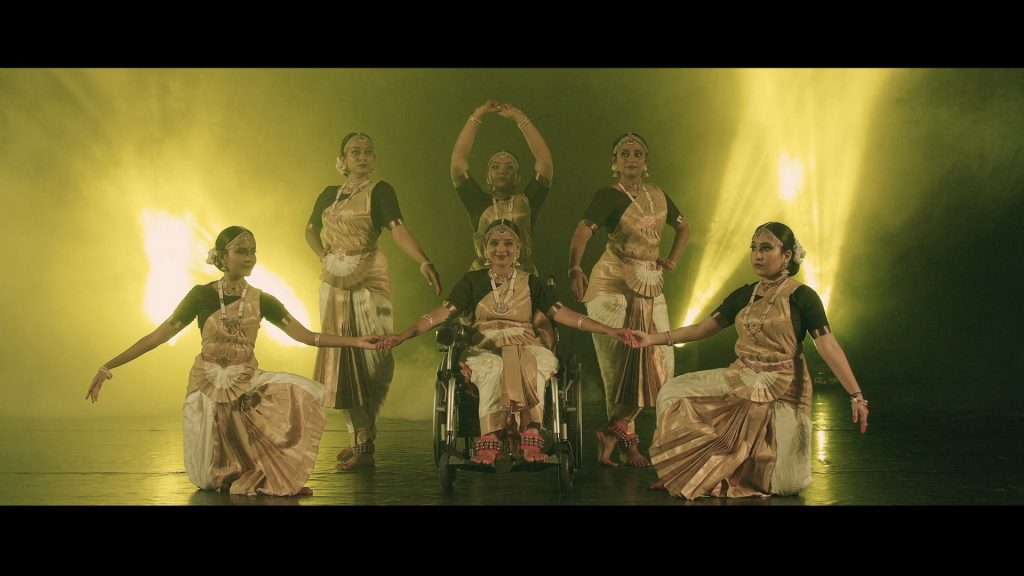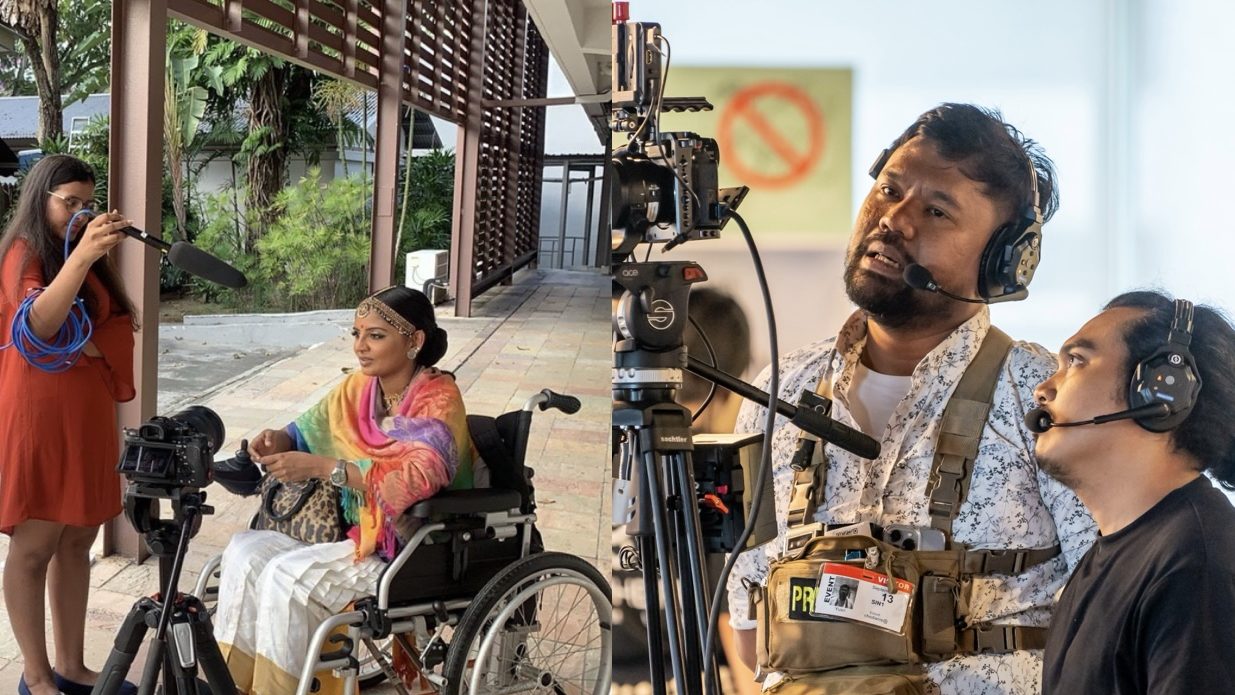SINGAPORE: Singapore is respected as a multicultural society, especially in today’s increasingly polarized world. However, there’s no guarantee it will always stay that way if something is not done to prevent it from fading away.
As such, two filmmakers endeavour to do just that—to prevent Singapore’s multilingual heritage from fading by preserving one key aspect: the mother tongue.
Priyanka Tamilarasan and Yusri “Shaggy” Sapari understand that fewer and fewer people use Malay and Tamil today and that there is a “decline in our ability to fully understand the delicate strands of cultural identity that make the lives of Singaporeans so diverse and so special.”
Therefore, they’ve featured “ordinary Singaporeans doing ordinary things with extraordinary hearts” in their films.
In Ms Tamilarasan’s case, it’s Ambiga Krishasamy, a lifelong practitioner of the traditional Tamil Nadu dance art of Bharatnatyam, the heroine of her documentary Abinayam.

Mr Sapari’s Trailer Boys introduces everyone to Singapore’s Malay and Singlish-speaking heavy vehicle driver community. The documentary won him the Audience Choice Award at the Viddsee Juree Awards.

The two have been revitalizing the conversation surrounding multilingualism in Singapore, with their films screened by the storytelling project Qrious Culture, with support from the Lee Kuan Yew Fund for Bilingualism.
The Independent Singapore (TISG) interviewed Ms Tamilarasan and Mr Sapari to learn more about their journeys. The interview below has been lightly edited for clarity.
TISG: What do you feel is getting lost as Tamil and Malay fade further and English gains ascendancy?
Priyanka: Tamil has a long and storied literary tradition, with ancient texts like the Sangam poetry and Thirukkural. As the frequency of the language declines, the literary heritage might lose its essence, preservation, and appreciation.
Shaggy: Mother tongue is a gateway to your own culture. If you lose this, you risk losing connection to understanding yourself and where you come from.
Priyanka: The Tamil language is the key carrier of Indian culture. Beyond communication, it remains a vessel for rich traditions, stories, and customs. As its use declines, there remains a risk that these may not be as effectively passed down to future generations.
Shaggy: When we lose connection to our culture, we lose our ability to understand ourselves, our community, and our family. Our sense of identity is important.
Mother tongue helps us root ourselves to know where we come from. When that is lost, we become cultural orphans. Why look so far to know ourselves when home has always been here?
TISG: Why is this particular issue so important to you?
Priyanka: I loved learning about my cultural roots and yet, oddly, struggled to read and write in Tamil. That’s when I told myself to put in the extra work, which might mean watching a Tamil movie weekly, picking up a book to read, or listening to the Tamil radio station.
If you choose to put in the work, you begin to realize a deeper sense of connection to the Tamil language.
Shaggy: I wanted to give people a sense of comfort that they are being heard. Without being restricted to only speaking in English, the people featured in the documentary are free to express themselves in a way that feels most natural to them.
When people are comfortable, they can show their best authentic selves and shine. It also allows them to communicate beyond words and connect with the audience on a different level.
TISG: What can be done to prevent further “loss of soul” in Singapore?
Priyanka: Let’s not be so defensive over the need to speak the language perfectly. It’s perfectly fine to allow yourself to mix a fair amount of English words while communicating in your Mother tongue. What matters to me is the fact that someone’s trying.
Shaggy: The world is a diverse place. If we want to contribute to the world’s diversity, we must embrace our roots. This is something tangible and undeniable about ourselves. A lot of the soul of our culture is better expressed in our mother tongue to be appreciated.
Priyanka: My film Abinayam serves as a testament to the power of bilingualism in preserving and conveying cultural stories.
This documentary is a tribute to Bharatnatyam dancer Ambiga Krishnasamy, who has continued to inspire with her unwavering passion for dance despite battling multiple sclerosis.
To authentically capture Ambiga’s story, I deepened my Tamil language skills, allowing me to engage with her narrative on a more profound level. By doing so, I was able to present her resilience and dedication with the depth and sensitivity it deserves.
Shaggy: Singaporeans are a diverse people. One of the key things about being Singaporean is how we live harmoniously together with all our differences. When we embrace bilingualism, we can then see each other for who we are in all our different colours.
Being open about our differences helps every group embrace the differences and find a way to see each other as different yet unique.
TISG: With your respective documentaries, what do you want to say about Tamil and Malay?
Priyanka: Abinayam showcases how Tamil and Bharatanatyam are not just historical artefacts but living traditions that continue to evolve and inspire.
Shaggy: Bahasa Melayu is spoken by 290 million people in maritime Southeast Asia. It is also known as bahasa persatuan or a unifying language.
As technology makes the world smaller, do not forget that we exist in the centre of Maritime Southeast Asia. The Malay language is a gateway to this region.
I am glad to have contributed one small work to the rich tapestry of this region. I hope Malays continue to embrace their culture as it represents this great region’s rich history and presence in Southeast Asia.
TISG: What do you want to tell younger generations of Singaporeans?
Priyanka: I hope to inspire the younger generation to appreciate and build upon the legacy that came before them. It’s crucial to instil a sense of pride in our roots.
As such, I would like to encourage the younger generation to continue fostering the unity and progress that define Singapore. You can do this by digging deeper when it comes to learning about your Mother tongue, culture, or traditions.
Always ask “why” and keep the conversation going!
Shaggy: Your mother tongue is a gateway to understanding your own culture. We live in a world where you can easily access and learn about other cultures.
After a while, you realise you are filling your heart with other cultures. No matter how much you learn, you will never be more at home than embracing what is truly yours, the culture that you come from.
Many of your questions about yourself can be answered as you go deeper into learning about your own culture. What you do with the knowledge is up to you. You need to know where you come from to truly get where you want to be in life. /TISG

